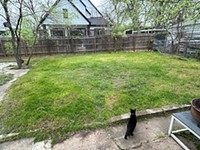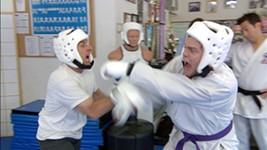Austin City Council Reinstates Partial Camping Ban
Governor sends in TxDOT; Kitchen leads effort for more explicit rules
By Austin Sanders, 3:35PM, Fri. Oct. 18, 2019
After City Council voted on Thursday, Oct. 17, to partially reinstate a ban on public camping, Gov. Greg Abbott announced today, Oct. 18, the Texas Department of Transportation would begin clearing out areas under overpasses in Austin.
In a statement first reported by the Statesman, an Abbott spokesperson said TxDOT will “advance strategies to clear homeless encampments under bridges, and the Texas Department of Public Safety will work with Austin APD, the University of Texas, and all state-related facilities to ensure safety and security.”
At a press conference on Friday afternoon, Mayor Steve Adler responded, “I don’t know which (overpasses) he would intend to do that with, but there are certain areas under overpasses that are not safe for people to be in” where camping will be prohibited after passage of the revised ordinance on Thursday. “If the governor just goes in and moves people away from those palaces, or fences off those areas,” Adler told reporters, “I want to know where those people are supposed to go. My fear is if the governor just moves (people) to hide them, they’ll just go to places that are less safe.”
Before the Gov. decided to flex as the “law and order” leader, a long, drawn out process at City Hall Thursday led to the Council voting 7-4 to ban camping within 15 feet of a residence or business during operating hours, near the Austin Resource Center for the Homeless, and within a quarter-mile* of any newly built city shelter providing services to people experiencing homelessness. CMs Kathie Tovo, Ann Kitchen, Alison Alter, and Leslie Pool voted against the changes. The changes will go into effect on Oct. 27.
But the partial ban reinstated last night could have been much more widespread. The four nay votes did so, because in their view, the resolution brought by Adler – with amendments from Mayor Pro Tem Delia Garza and CM Greg Casar – did not go far enough. Their preferred version, crafted by Tovo and Kitchen over the past several weeks, would have banned camping, sitting and lying on all sidewalks throughout the city, and included language explicitly banning those behaviors in creek and river beds, storm drains, and other specific locations.
Generally, the Adler-Casar-Garza document favored a less explicit approach to spelling out what behaviors should be prohibited and where, leaving that work up to city staff and the police department. (Two weeks ago, Police Chief Brian Manley did just that by directing his officers judge if someone camping is an obstruction based on several factors). At one point during the meeting, CM Jimmy Flannigan described his opposition to some of the amendments as a desire to allow experts to make the “context sensitive” decisions necessary to determine, for example, which traffic medians and areas under overpasses are dangerous.
The resolution approved last night does not allow any of the behaviors specifically mentioned in the Tovo-Kitchen ordinance, however. It merely relies on other statutes – city ordinances, state and federal law – that prohibit behaviors like obstructing an ADA accessible ramp.* So when some on the Council – as Kitchen did shortly in a press release shortly after the vote last night – say certain provisions were “not included” in the resolution they approved, they just mean the explicit language was not used. The behavior itself is still prohibited.
But the Tovo-Kitchen side of the dais said it was important to include that level of specificity, because the community – mostly the vocal crowd that clamored for the ordinance changes to be rescinded over the summer – desired a greater degree of clarity in what behaviors were prohibited.
Kitchen also reiterated throughout the night that it was the Council’s obligation to craft policy that clearly spells out how the city is keeping its residents safe – such as saying in the ordinance, explicitly, that camping oni a traffic median is prohibited. To be clear – APD officers are empowered to prevent a person from camping in such a situation if they determine doing so poses a “substantial risk” to their safety or the safety of someone else, but that comes from a training bulletin issued by Chief Manley, not the ordinance itself.
Throughout a tedious amendment process, Kitchen, Tovo, Pool, and Alter each took turns pitching provisions to Adler’s resolution that would, in effect, bring it closer to the Kitchen-Tovo version. Most of those amendments failed along 7-4 votes, but one prohibiting camping in high risk wildfire areas did pass with a 7-3-1 vote (Adler, Casar, and CM Natasha Harper-Madison against and Garza off the dais).
The approved resolution also provides instructions to law enforcement officers on what must happen before a citation can be issued against anyone violating the amended camping, sitting, and lying ordinances. If an individual is camping near the ARCH or a future shelter, they must be offered an available non-shelter housing unit, and they cannot be asked to move until staff certifies that the individual was given an “adequate opportunity to participate” in services and was “adequately educated” on the city rules relating to camping, sitting, and lying. (Again, anyone obstructing passage, or posing a threat to themselves or others, can be moved immediately.) If someone is believed to be in violation of the outside of a shelter area, officers must make a similar offer to connect the individual with services. If the person declines, the officer must tell them where they can go – i.e., if moving a few feet would bring them out of the 15 foot ban near business entrances, they can do that.
Whatever Abbott decides to do next, Council is ready to move on from the debate that consumed City Hall over the long, hot summer. Casar told the Chronicle after the Thursday vote, “Gov. Abbott asked us to go back to criminalizing poverty itself, and Austin isn't going to do that. We’re done revising these ordinances.” (Well, not totally done with the debate. A resolution outlining a “homeless encampment strategy” that accompanied the Tovo-Kitchen ordinance was postponed, along with the item on the Rainey Street District fund, because Tovo was not feeling well.) In a statement issued after the vote, Kitchen said, “I am disappointed that Council declined to clearly state in the law that areas like medians under our South Austin highways pose risks for our homeless neighbors,” but, she agrees with her colleagues that it’s time to move forward with housing people.
Earlier in the meeting, as the debate on the camping ordinance began, Chief Manley was asked again if the city was experiencing a public safety crisis. It isn’t, he repeated, saying the city was facing more of a “public order” crisis; meaning there is a perception in the public that the city is less safe because of the increased visibility of homelessness stemming from the June ordinance changes. The perception is largely based on anecdotes amplified by some in the media and many on social media.
Manley also shared data on how crime rates have actually changed year-to-year, between July and September in 2018 and 2019. Citywide, the data shows a 6% increase in violent crime and a 5% increase in property crime during that period; although those numbers are 15% and 18%, respectively, downtown.
The Chief also shared stats involving “homeless suspects” and “non-homeless victims”. There, the cases in which a suspect was experiencing homelessness and the victim was housed grew by 11% in violent crimes and 2% in property crimes. But the inverse of those scenario saw a much larger increase.
Property crimes committed by housed people against those experiencing homelessness grew by 42% year-to-year, with violent crimes increasing by 19%. The data backs up a claim commonly made by advocates – that people experiencing homelessness are the most vulnerable in our city, and more likely to be the victim of crimes and not the perpetrator of them.
Council also gave final approval to the zoning case at 4700 Riverside Drive, which is expected to generate about 4,700 new housing units, office space, and hotel rooms – but at the cost of about 1,300 existing housing units considered “market rate affordable.” The developer of the project known to detractors as the “Domain on Riverside,” Presidium, estimates they will be able to provide between 400 to 565 income-restricted units at 60% of Austin’s median family income.
An agreement reached with the Ending Community Homelessness Coalition will also reserve for housing at the new development for 100 people experiencing homelessness, as well as in-home medical care and social services – at a cost of $1.75 million – while they are staying there. The developer concessions were not enough to sway Pool, Garza, and Casar; the latter pair, who have generally supported building new housing across the city, have cited their fears that demolishing existing units that are already providing affordable homes for families could do more harm than good. They both said developments such as these should be done in greenfield and greyfield spaces; not as redevelopments of aging multi-family apartment complexes.
* Since it was first published, this story has been corrected to rectify errors in editing.Got something to say on the subject? Send a letter to the editor.
A note to readers: Bold and uncensored, The Austin Chronicle has been Austin’s independent news source for over 40 years, expressing the community’s political and environmental concerns and supporting its active cultural scene. Now more than ever, we need your support to continue supplying Austin with independent, free press. If real news is important to you, please consider making a donation of $5, $10 or whatever you can afford, to help keep our journalism on stands.
April 19, 2024
homelessness, camping ban, Greg Abbott, camping ordinance, Steve Adler, Greg Casar, Ann Kitchen, Kathie Tovo, Brian Manley, Austin Resource Center for the Homeless









